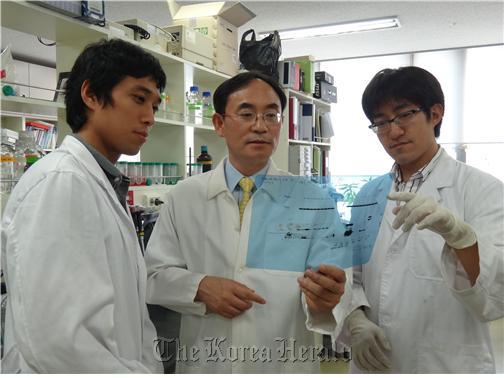Korean scientists found that an enzyme suppressing protein aging also causes and accelerates cancer growth, which could open a new door to treating the fatal disease.
Sunkyunkwan University professor Han Jeung-whan and his research team found that an enzyme, called Protein L-isoaspartyl methyltransferase or PIMT, negatively regulates another protein, known as protein 53.
P53 plays an important role in reducing the growth of cancer cells and killing them.

It was previously thought that PIMT only helped repair aged proteins.
Researchers around the world have been working on developing cancer treatment drugs based on the cancer suppressor p53, which have so far shown disappointing results with some cases of side effects.
The research by Han and his team shows that PIMT methylates p53 ― meaning it reacts with it to slightly change its structure.
In the methylation, the enzyme destabilizes the protein by enhancing the p53―HDM2 interaction, which eventually reduces p53 protein levels.
HDM2 is a negative regulator of the p53 tumor suppressor.
The team also found the increased PIMT and reduced p53 in malicious cancer cells.
The death rate of cancer patients with an overexpression of PIMT is 20 percent higher than others.
“We have found the principle of how the enzyme causes or facilitates cancer by suppressing p53 activity. The finding provides a clue to diagnosing cancer and has opened a possibility for developing a new cancer treatment drug” said Han.
Cancer is the No. 1 cause of death in Korea.
The research, supported by the Ministry of Education, Science and Technology and National Research Foundation of Korea, was published on June 27 in Nature Communications, an online journal published by the Nature Publishing Group.
By Kim Young-won (
wone0102@heraldcorp.com)








![[Today’s K-pop] Blackpink’s Jennie, Lisa invited to Coachella as solo acts](http://res.heraldm.com/phpwas/restmb_idxmake.php?idx=644&simg=/content/image/2024/11/21/20241121050099_0.jpg)